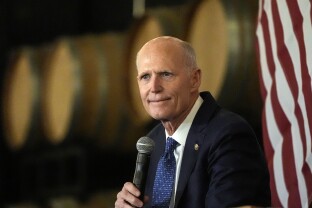Rick Scott is projected to beat former Democratic Congresswoman Debbie Mucarsel-Powell in Florida’s Senate race, despite Democrats’ hopes that ballot questions and new political vulnerabilities — including rifts with leadership in his own party — on Scott’s end would lift their candidate.
The Associated Press called the race for Scott on Tuesday, and the senator’s reelection points to the party’s ever-growing influence over the state, which was once a battleground. In the land of Donald Trump, Ron DeSantis and culture wars, Democrats don’t seem to be gaining any steam.
But Democrats believed this year would be Scott’s hardest reelection campaign yet, in part because he had gotten into trouble with his own party and was attacked by his opponent over his proposal in 2022 to sunset all federal legislation after five years.
Sen. Mitch McConnell and Mucarsel-Powell criticized his position as a proposed end to Social Security and Medicare. (Scott said his position was “not intended to include entitlement programs such as Medicare and Social Security” in a Washington Examiner op-ed.)
The proposal was part of the 12-point “Rescue America” plan that Scott ran on, which included priorities that reflected national party messaging in areas that have come to be the subject of culture wars, including trans rights and education.
Having Trump at the top of the ticket likely did Scott some favors.
“Some of the rhetoric [Scott has] had out on the campaign trail — talking about taxes, talking about inflation, talking about border security — [maps] largely with former President Trump and the conversations they’re having at the national top of the ticket,” said Republican strategist Matt Terrill who was chief of staff for Sen. Marco Rubio’s presidential campaign. “I think you largely see [Scott] focused in on a lot of the key messaging that the former President Trump is focused in on.”
Scott, who was first elected to the U.S. Senate in 2018, beat Democratic Sen. Bill Nelson by less than a percentage point in that race. This time, he was running two campaigns at once: one in his home state and another for a leadership position in the Senate. He is running to succeed McConnell as Senate GOP leader against Sens. John Cornyn and John Thune, two of McConnell’s close allies with high rankings.
Scott previously challenged McConnell for the top spot in the conference following a disappointing 2022 cycle for Republican Senate candidates. Scott was chair of the National Republican Senatorial Committee for the 2022 cycle and faced criticism from his party about his approach to the job, including McConnell questioning “candidate quality.”
Now that Scott’s campaign in Florida is over, he has a short turnaround to the next contest: Senate Republicans will vote to elect new leadership on Nov. 13.
There will still be plenty to unpack over the Florida Senate results, especially for Democrats. National Democrats made the case in the lead-up to Election Day that Florida was a place where they could expand their battleground map. Mucarsel-Powell and others in her party argued Florida was still in play this year, in part pointing to ballot measures that would legalize recreational marijuana and enshrine abortion into the state’s constitution.
But Democrats on the ground in Florida felt they were on their own this election cycle, arguing national support from the party wasn’t enough. Mucarsel-Powell touted her own fundraising ability when NOTUS asked about national support she’d received. Scott’s campaign said the low investment reflected national Democrats viewing her as a “waste of money.”
The Democratic Senatorial Campaign Committee announced a multimillion-dollar investment in television ads for Mucarsel-Powell in Florida and Colin Allred in Texas, as part of a “$79 million advertising onslaught” in nine states this election cycle. This came after the DSCC announced $25 million toward directly contacting voters in Florida and other states.
Senate Democrats were “going on offense” in the state, DSCC Chair Gary Peters said in the announcement.
But Republicans in the state have been strengthening their grip on it for decades, with the number of registered GOP voters in the state leading the number of Democratic voters by a million.
“Republicans enjoy the largest voter registration advantage they’ve ever had in the history of Florida, so I think by every conceivable metric, it would be foolish to say Florida is anything but a red state,” said Fernand Amandi, a Democratic strategist. “The question is now, is it a dark ruby red state that is no longer accessible to Democrats?”
—
Em Luetkemeyer is a NOTUS reporter and an Allbritton Journalism Institute fellow.
Sign in
Log into your free account with your email. Don’t have one?
Check your email for a one-time code.
We sent a 4-digit code to . Enter the pin to confirm your account.
New code will be available in 1:00
Let’s try this again.
We encountered an error with the passcode sent to . Please reenter your email.


